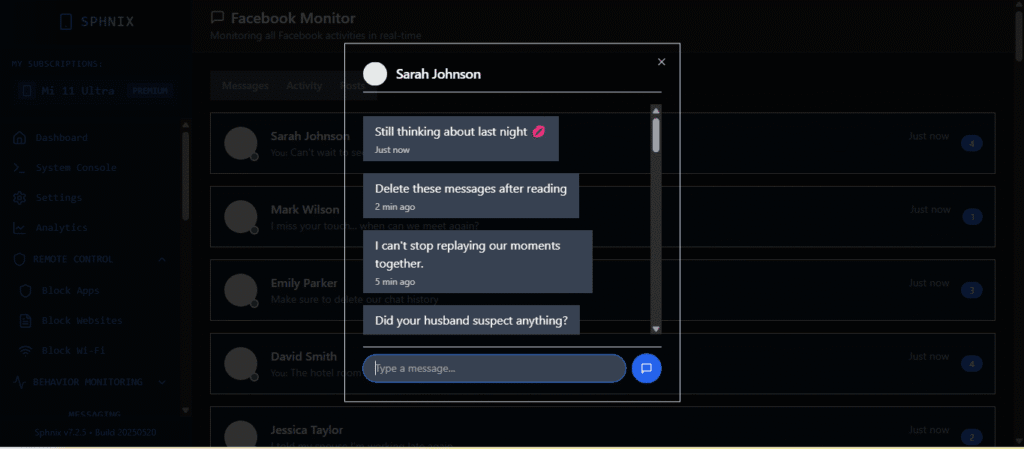When doubts creep into your relationship, the need for proof can become overwhelming. Many partners suspect infidelity but struggle to confirm it. That’s where technology comes in. Hiring a hacker to catch a cheating spouse is no longer about shadowy figures behind a computer screen—it often involves tools like Sphnix, a professional monitoring solution built to give clarity when trust is broken.
In my 10 years of experience in cybersecurity and phone monitoring, I’ve seen how couples use digital evidence to confront hard truths. I’ll explain how it works, the role of Sphnix, and what you should consider before taking this step.

Why People Consider Hiring a Hacker
- Suspicious behavior: Sudden secrecy with phones, late-night texting, or deleted call logs.
- Unexplained absences: Claims of work or friends’ outings that don’t add up.
- Financial inconsistencies: Unknown expenses linked to dining, travel, or gifts.
- Social media activity: Hidden accounts, secret messages, or flirtatious interactions.
For many, suspicions without proof lead to more stress than the betrayal itself. This is why some turn to hackers or monitoring tools to gather solid evidence. Ethical hacker are available for hire.

The Role of Sphnix in Catching Cheating Spouses
The screenshots show Sphnix, a phone monitoring platform that offers features beyond standard spying. Instead of blindly hiring a hacker, using a structured tool like Sphnix gives you a secure, centralized way to access the information you need.
Key functions:
- Block Websites and Apps: As seen in the dashboard, you can restrict Facebook, Instagram, Twitter, TikTok, and other platforms where affairs often start.
- Message Monitoring: In the Facebook monitor panel, you see live conversations. For example, a chat from “Sarah Johnson” shows messages about secret meetings. These records provide undeniable evidence.
- Remote Access: Sphnix lets you track device usage in real time—battery, location, security, and network activity—without physical access.
This is why many people who think about hiring a hacker choose solutions like Sphnix. It removes the guesswork and delivers concrete data. For example WhatsApp hacking, you can use Sphnix to watch conversation.

My Personal Insights from the Field
After a decade of working with clients in similar situations, here’s what I’ve learned:
- Proof changes everything. Once you see the chats, locations, or calls, you’re no longer living in doubt.
- Not all hackers are reliable. Many scams exist. People pay and get nothing. Tools like Sphnix provide a professional alternative that doesn’t rely on shady freelancers.
- Confrontations go smoother with evidence. Instead of arguments based on suspicion, screenshots and logs give you clarity.
- Some reconcile, some separate. Truth helps both outcomes—whether it leads to rebuilding trust or walking away.
Benefits of Using Sphnix Over Random Hackers
- Transparency: You control the monitoring dashboard.
- Reliability: Unlike freelancers, the system works consistently.
- Multiple Features: Beyond spying, you can block apps, monitor Wi-Fi, and track behavior.
- Discretion: Everything happens silently. Your partner won’t know.
Hiring a hacker to catch a cheating spouse often feels risky. Using Sphnix shifts that risk into a professional, structured tool.
Ethical and Legal Considerations
While the need for truth is real, you should also think carefully about laws in your country. In some places, accessing a partner’s private messages without consent can cross legal boundaries.
What I advise:
- Check your local laws. Some regions allow monitoring for shared devices or under parental control clauses.
- Use evidence responsibly. Screenshots should guide your personal decisions, not as tools for public humiliation.
- Seek advice. If unsure, consult a lawyer before acting on the information.
How to Get Started with Sphnix
The system shown in the screenshot makes setup simple:
- Choose a plan. Subscriptions like the “Mi 11 Ultra Premium” provide full access.
- Install remotely. Once linked to your partner’s device, data flows into your dashboard.
- Monitor activity. View chats, block suspicious apps, and track device behavior in real time.
- Gather evidence. Export or screenshot proof for when you’re ready to confront your spouse.
This is the safe way to approach what people mean when they search “hiring a hacker to catch a cheating spouse.”
Conclusion
Trust, once broken, is hard to rebuild. Suspicions without proof only worsen the pain. Hiring a hacker to catch a cheating spouse often feels like the only way to get clarity—but instead of relying on faceless freelancers, tools like Sphnix provide a professional, reliable, and discreet solution.
If you’re in doubt, you don’t need to live with endless questions. With Sphnix, you gain control, evidence, and the peace of mind to make informed choices about your relationship.
FAQs
1. Is hiring a hacker to catch a cheating spouse legal?
It depends on your country. Monitoring shared devices or under family agreements is often legal. Accessing private accounts without consent can cross boundaries. Always check local laws.
2. How does Sphnix compare to traditional hackers?
Sphnix is safer. Instead of depending on a stranger to break into accounts, you use a structured tool with proven features. It reduces risk and gives you control.
3. What kind of evidence can I get with Sphnix?
You can see call logs, SMS, social media chats, browsing history, blocked apps, and even GPS location. This gives you a full picture of your partner’s behavior.
